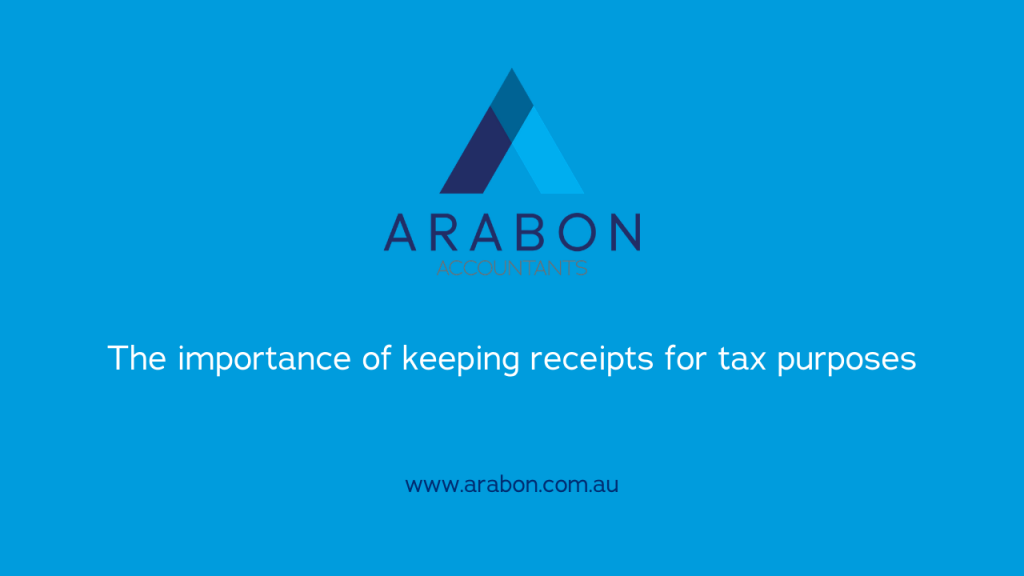It is probably safe to say that one of the financial matters we all dread is our tax. For those with more complicated tax matters and expensive deductions, the importance of keeping and tracking receipts for tax purposes is crucial. So, how do you stay on top of them? How do you safely store these sometimes small, flimsy and fading pieces of paper so they don’t literally fly away?
What is the importance of keeping receipts?
For tax purposes, receipts are essential. Receipts are evidence of purchases you wish to claim as work-related expenses. While most of what we do and transact is online, many receipts remain physical and made from paper which calls for a safe and efficient storage system. Necessary in operating a successful business, is having an organised record of purchases as well as streamlining your own personal life before tax time rolls around. Whether you’re wanting to better organise your receipts, business or just be better at budgeting, you will need to track all work-related receipts. These tips should get you on the right path:
Schedule a regular time to record and store receipts
We all know how easy we can be distracted and then forget to do the task we were about to do. Some of us simply aren’t programmed to do and remember a number of different tasks at the same time. Therefore, something you should be in the habit of doing is recording your receipts as soon as you possibly can. This is very important if yours is a business juggling many of them. Schedule some time during the day or week to sort out your receipts before they get the better of you.
Another great habit to adopt is recording the details of the receipt before you forget. What was the expense for, if it is business related, where to allocate in the budget etc. Making these notes as you accrue the receipt helps keep the information front of mind and assists with recording important receipts.
Develop a system to store paper receipts
The next step in streamlining your purchases is to start categorising your receipts in a filing system allowing you to find something when you need it in the future. This saves you time down the track when you are looking for something specific, eliminating the need to rifle through little pieces of paper.
Store your receipts online
As we all know, paper receipts fade over time despite our best attempts. If your supplier offers you a digital receipt, you can have that emailed to you. Otherwise, there are ways to store paper receipts electronically. You can scan it into the computer with a scanner. Once scanned, categorise your receipts into your computer filing system ideally a cloud-based drive to ensure it is always safe and then either keep or throw away the paper receipt.
Alternatively, take a picture of the receipt with your phone, keep on your device and ensure you back up your images on a cloud-based drive so they’re safe forever.
Use an app to store and organise your receipts
If you don’t wish to store business receipts on your personal device, then there are apps available that store your receipts digitally. These apps not only store your receipts, they can also generate expense reports to make tracking your finances even easier. One of the most popular apps that we recommend to our clients is Dext (formerly called ‘Receipt Bank’). This app doesn’t require data entry; it simply collates all your receipts, bills and invoices together in one place. It also integrates with Xero so that your accountant or bookkeeper has access to all necessary data, saving you time and effort. There are a many similar apps that are available. Contact your Arabon accountant to discuss what may be most suitable for your business.
Develop a routine and be consistent
It may sound easier than it is in practice, but our most important piece of advice is to develop a routine, create a habit and maintain a consistency with how you store your receipts. Together with all of these tips, the most important step in organising your receipts is to be consistent. If this doesn’t come naturally to you, set yourself a reminder in your diary and stick with it. This is particularly important for small business owners who wear many hats. This seemingly time-consuming admin job may fall to the bottom of the list of priorities, but it needn’t have to with a good routine in place.
A final tip to consider is to have two credit cards – one for business and one for personal expenses. Keeping these two parts of your life distinct from each other and avoid paying cash for business expenses may assist with halving this business task.
If you feel like you’re drowning in expenses paperwork and don’t know where to start, contact your Arabon accountant today to discuss what system will work best for your business. Call 1300 ARABON today or make an appointment online.






